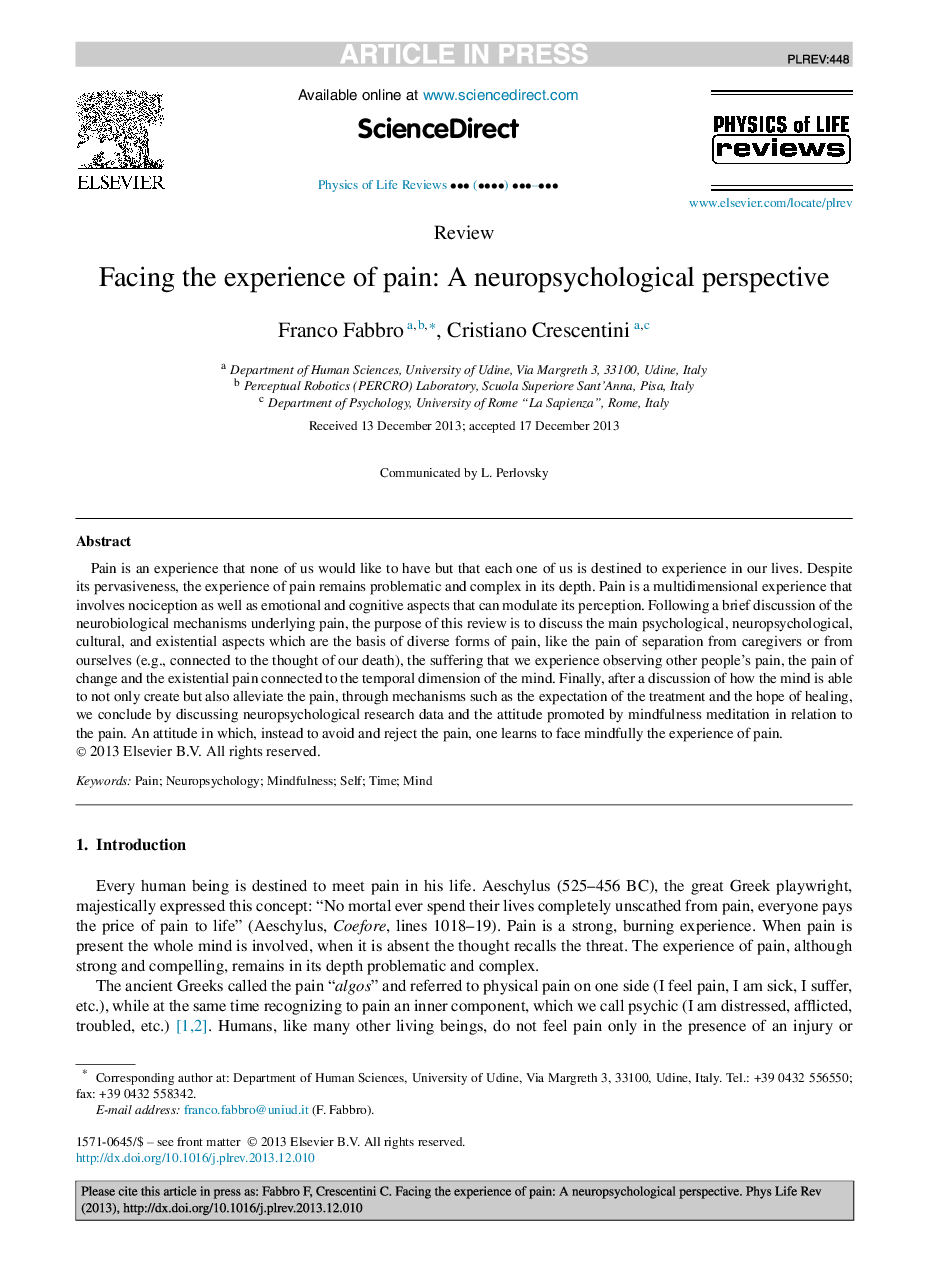| کد مقاله | کد نشریه | سال انتشار | مقاله انگلیسی | نسخه تمام متن |
|---|---|---|---|---|
| 8207255 | 1530892 | 2014 | 13 صفحه PDF | دانلود رایگان |
عنوان انگلیسی مقاله ISI
Facing the experience of pain: A neuropsychological perspective
ترجمه فارسی عنوان
مواجهه با تجربه درد: دیدگاه عصب شناختی
دانلود مقاله + سفارش ترجمه
دانلود مقاله ISI انگلیسی
رایگان برای ایرانیان
کلمات کلیدی
درد، نوروپسیولوژی، ذهن آگاهی، خود، زمان، ذهن،
ترجمه چکیده
درد تجربهیی است که هیچکدام از ما دوست نداریم اما هر یک از ما در زندگی ما تجربهی زندگی است. با وجود فراگیر بودن آن، تجربه درد در طول عمر موجب مشکل و پیچیده می شود. درد یک تجربه چند بعدی است که دربرگیرنده خلط شدن و همچنین جنبه های احساسی و شناختی است که می تواند ادراک آن را مد نظر قرار دهد. به دنبال بحث کوتاه درباره مکانیزم های نوروبیولوژیکی که مبتلا به درد هستند، هدف این بررسی بحث در مورد جنبه های اصلی روانشناختی، روانشناختی، فرهنگی و وجودی است که اساس انواع مختلف درد هستند، مانند درد جدایی از مراقب و یا از خودمان (به عنوان مثال، به فکر مرگ ما)، رنج هایی که ما در حال مشاهده درد های دیگران، درد تغییر و درد موجودی مرتبط با ابعاد زمانی ذهن، تجربه می کنیم. سرانجام، پس از بحث در مورد اینکه چگونه ذهن قادر است نه تنها ایجاد، بلکه درد را نیز کاهش می دهد، از طریق مکانیسم هایی مانند انتظار درمان و امید بهبودی، ما با بحث درباره داده های تحقیق عصب شناختی و نگرشی که توسط مراقبه ذهن آگاهی ترویج می شود، در ارتباط با درد. یک نگرش که در عوض برای جلوگیری از درد و رد کردن آن، یاد میگیرد که به تجربه ذهن مبتلا شود.
موضوعات مرتبط
مهندسی و علوم پایه
فیزیک و نجوم
فیزیک و نجوم (عمومی)
چکیده انگلیسی
Pain is an experience that none of us would like to have but that each one of us is destined to experience in our lives. Despite its pervasiveness, the experience of pain remains problematic and complex in its depth. Pain is a multidimensional experience that involves nociception as well as emotional and cognitive aspects that can modulate its perception. Following a brief discussion of the neurobiological mechanisms underlying pain, the purpose of this review is to discuss the main psychological, neuropsychological, cultural, and existential aspects which are the basis of diverse forms of pain, like the pain of separation from caregivers or from ourselves (e.g., connected to the thought of our death), the suffering that we experience observing other people's pain, the pain of change and the existential pain connected to the temporal dimension of the mind. Finally, after a discussion of how the mind is able to not only create but also alleviate the pain, through mechanisms such as the expectation of the treatment and the hope of healing, we conclude by discussing neuropsychological research data and the attitude promoted by mindfulness meditation in relation to the pain. An attitude in which, instead to avoid and reject the pain, one learns to face mindfully the experience of pain.
ناشر
Database: Elsevier - ScienceDirect (ساینس دایرکت)
Journal: Physics of Life Reviews - Volume 11, Issue 3, September 2014, Pages 540-552
Journal: Physics of Life Reviews - Volume 11, Issue 3, September 2014, Pages 540-552
نویسندگان
Franco Fabbro, Cristiano Crescentini,
